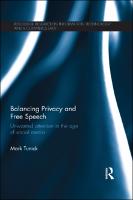Balancing Privacy and Free Speech
Proposal review
Unwanted Attention in the Age of Social Media
Author(s)
Tunick, Mark
Collection
Knowledge Unlatched (KU)Language
EnglishAbstract
In an age of smartphones, Facebook and YouTube, privacy may seem to be a norm of the past. This book addresses ethical and legal questions that arise when media technologies are used to give individuals unwanted attention. Drawing from a broad range of cases within the US, UK, Australia, Europe, and elsewhere, Mark Tunick asks whether privacy interests can ever be weightier than society’s interest in free speech and access to information. Taking a comparative and interdisciplinary approach, and drawing on the work of political theorist Jeremy Waldron concerning toleration, the book argues that we can still have a legitimate interest in controlling the extent to which information about us is disseminated. The book begins by exploring why privacy and free speech are valuable, before developing a framework for weighing these conflicting values. By taking up key cases in the US and Europe, and the debate about a ‘right to be forgotten’, Tunick discusses the potential costs of limiting free speech, and points to legal remedies and other ways to develop new social attitudes to privacy in an age of instant information sharing. This book will be of great interest to students of privacy law, legal ethics, internet governance and media law in general.
Keywords
free speech; internet governance; legal ethics; media; privacy; social mediaDOI
10.4324/9781315763132ISBN
9781317650379, 9781138689756, 9781138791053, 9781315763132, 9781317650379Publisher
Taylor & FrancisPublisher website
https://taylorandfrancis.com/Publication date and place
2015Grantor
Imprint
RoutledgeSeries
Routledge Research in Information Technology and E-Commerce Law,Classification
Privacy law
Legal ethics and professional conduct
Entertainment and media law
IT and Communications law / Postal laws and regulations


 Download
Download